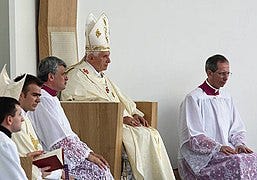Pope Benedict on the Link between Political Freedom, Religious Freedom, and Right Worship
Commentary
Pope Benedict XVI’s recent passing has given rise to a great deal of commentary on the significance of his pontificate, his historical decision to resign, and speculation on what the future may hold for the Church. More productive, however, would be using the time to revisit and reflect on his prolific writings over the course of a theological career that spanned decades, fo rhe was arguably the greatest theologian of the twentieth century, and his works reward close study.
One of his especially valuable books was The Spirit of the Liturgy(SL), published in 1999 when he was Joseph Cardinal Ratzinger. It was named after and explicitly meant to evoke Romano Guarini’s book by the same name published in 1918. Pope Benedict credited that little book with leading to a rediscovery of the liturgy in Germany
“in all its beauty, hidden wealth, and time-transcending grandeur, to see it as the animating center of the Church, the very center of Chrsitan life ” (SL 7).
Pope Benedict warned however, that in recent years, however, the liturgy was in danger. He even spoke of it as “threatened with destruction,” and so wrote his own Spirit of the Liturgy in the hopes of starting a new liturgical movement that would move people, internally and externally, toward the right way of celebrating the liturgy.
Early in the book, however, while reflecting on the Exodus story, he makes a point that might seem surprising: the connection between political freedom and the duty to right worship. The point might slip by many who have not read the scriptural account of Exodus deeply in some time; we tend to be so familiar with various shortened or film versions of Mosses and Exodus that certain details in the actual text may slip by us.
We may be tempted to think of Moses’ command to Pharaoh to let God’s people go as purely a sort of political freedom, where the freedom of an oppressed group of people from slavery was the main goal and highest end. And yet, Pope Benedict points out that that is not the case. Moses did not simply go to Pharaoh and command, “let my people go.” Rather, he delivered God’s command to “let my people go, to sacrifice to me” (Exodus 8: 20).
In response, Pharaoh tries to negotiate. Why could the Hebrews not simply sacrifice to God in the land of Egypt? Why go out in the wilderness? Moses will not accept the compromise. They must go out into the wilderness to worship. Pope Benedict writes, “the proper place of worship is in the wilderness” (SL 16). Again Pharaoh tries to compromise. He proposes to let the men go, but the women and children will remain behind. Later, he proposes that all could go, but animals and possessions will be left behind. Against these proposed compromises, Moses is firm:
“Moses cannot negotiate about the liturgy with a foreign potentate, not can be subject worship to any political compromise. The manner in which God is to be worshiped is not a question of political feasibility.... In all this, the only goal of the Exodus is shown to be worship, which can only take place according to God’s measure” (SL 16)
Several important points about right worship are made here. First, right worship can neither be made subject to the state, nor can it be compromised by or negotiated with the state. Compromise would have been easy for Moses, but he could not permit it. This is because of the second key point: God tells us how we are to worship Him. Worship is not something that human beings invent to suit their own fashions, desires, or convenience.
Moses does not know, at first,how they shall worship God. He only knows that God commands that they must go out into the wilderness to offer sacrifice. There, God will reveal the manner in which He is to be worshiped.
And so, finally, after ten plagues, Israel is finally able to depart Egypt. But they do not depart into mere political freedom, but something else. As Pope Benedict put it: “Israel departs, not in order to be a people like all others; it departs in order to serve God” (SL 16). Even the land they are promised is not the final good or the main point. The land itself is the place for the worship of the true God (SL 17).
On Sinai, finally, Israel is given details of how it is to worship. There, as Benedict writes, worship itself is bound up with both law and ethics. And when Israel falls away from the true worship of God, its freedom collapses (SL 19-20). Freedom, we cannot help but see again, is bound up with right worship. Freedom exists so that we may do what we are meant to do: and our primary duty is worship.

Pharaoh did not understand this. Israel often forgot it, and hence found themselves often chastised and conquered by foreign powers. When they fell away from right worship, they fell prey to all sorts of external (as well as internal) evils.
We, too, may be tempted to ignore or forget the connection between freedom and right worship today. To seek a freedom separated from worship of God is to risk destroying that very freedom. Yet, this is one of the great temptations of our modern world. And so we must be grateful to the Pope who reminded us of the link between religious freedom and political freedom, and of our first duty: to render to God the worship that He is due, not according to our own tastes, but according to His will.


